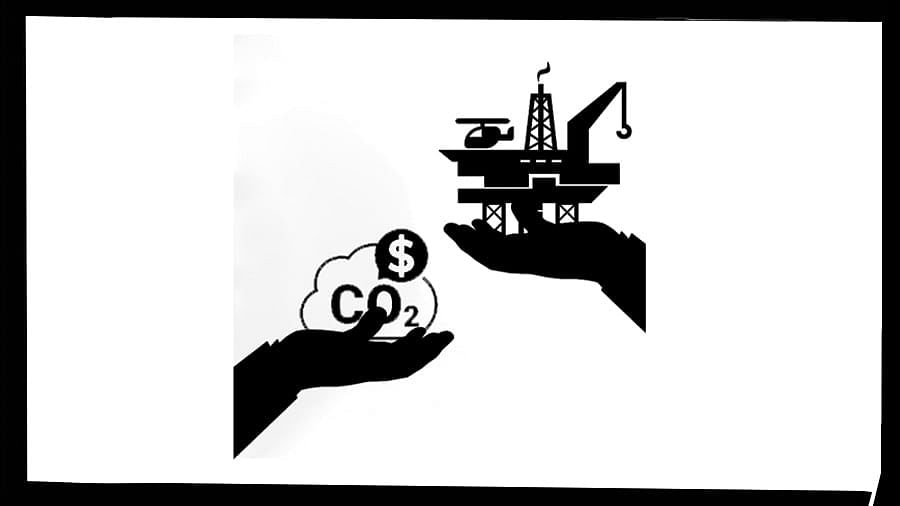
The United Nations Climate Change Conference, also known as COP29, in Baku, Azerbaijan, almost failed to address the pressing issue of climate finance for mitigation, adaptation, and loss and damage. Instead, the focus has shifted to insufficient rules for the carbon market. For the last few years, corporate boardrooms have been pushing ‘carbon offsets’ as a silver bullet solution to tackle the devastating impact of the climate crisis.
Carbon offsets refer to a practice where companies that emit greenhouse gasses buy carbon credits from projects that either capture carbon, such as reforestation or reduce emissions, like renewable energy projects.
Almost all big oil companies, such as Shell, Total, and Exxon, are advocating for or practising different models of carbon offsets that allow them to continue producing more oil and fossil gas.
In theory, this might sound like an efficient strategy to protect the planet; but in practice, these carbon offsets are far from the real climate solutions they are being advertised as. Instead, they have become a financial manoeuvre that allows these companies to continue their polluting practices while commodifying nature, in pursuit of supposed carbon neutrality.
The science of the carbon mitigation potential of nature, trees, and forests is highly disputed. Many scientists warn that there is evidence for carbon offsets being ‘ineffectual’ and ‘hindering the energy transition.’ Offsets are just a shady accounting trick; they can’t be a solution to fight climate change. Instead, they delay the real solution – cutting greenhouse gas emissions at their source, as quickly as possible.
Market-oriented solutions like carbon offsetting also further historical climate colonialism where emissions made in the Global North are often offset in the Global South. Poorer countries are forced to provide
the land and resources for carbon offset projects; they end up paying
the price through biodiversity loss, loss of indigenous lands, and ecosystem degradation.
Data maintained by the Berkeley Voluntary Registry Offsets Database shows that most of the current offset projects are located in Asia and Africa.
This should raise questions. Most of the companies that buy carbon credits and invest in these projects are headquartered in the Global North. When they cordon off land in the Global South to serve their disingenuous climate commitments, it is unlikely that they have the region’s best interests at heart.
A question of accountability
Project developers have repeatedly violated the rights of indigenous communities in various regions. In Peru, the Kichwa community alleged that they were forced out of their home in the Cordillera Azul National Park and received nothing from the $87 million agreement. They have received no support from the park authorities, who maintain that the actions were taken “within regulation.” This is, by no means, an isolated incident.
The Global Atlas of Environmental Justice shows that land conflicts arising from REDD+ (reducing emissions from deforestation and forest degradation in developing countries) and CDM (clean development mechanism) projects are largely concentrated in the developing world.
This brings us to an essential question – who is setting regulations, tracking project commitments, monitoring impact, and holding the companies accountable?
The system is known to lack transparency. According to CarbonBrief, the data released by carbon market registries today have missing values, inconsistencies, and issues with identifying companies directly responsible for a project.
Unsurprisingly, an analysis released earlier this year found that some of the largest corporations including ExxonMobil, Disney, Nestle, and Gucci were found to be investing in ‘junk’ offset projects. Essentially, these are worthless projects that are not equipped to achieve greenhouse gas emission reductions. Alarmingly, 33 of the top 50 carbon credit buyers hold junk offsets in their portfolios; yet, they unwaveringly stand by the carbon market as a viable mitigation mechanism.
The oil and gas companies, heavy-polluting industries like aviation, and big agricultural and forestry companies are now lobbying in global climate negotiations to adopt a more flexible and market-oriented carbon offset framework.
A media report says that more than 480 lobbyists who work on carbon capture and storage have been granted access to the COP29 summit. This indicates that big polluters see carbon offsets as an opportunity to keep drilling, refining, and burning fossil fuels without stopping emissions at the source.
At the same time, around 43% of the 81 million CO2 credits purchased by oil and gas companies have at least one fundamental flaw or are generally ‘junk’.
In addition to the environmental injustices, carbon offset projects threaten food security and economic stability. As big polluters race to grab land for offsetting, food production is threatened. According to estimates, if trees are planted to offset fossil fuel pollution, food prices could rise by 80% by 2050.
The Oxfam report found that the net zero plans of just four major oil companies – Shell, BP, Total, and Eni – would require an area twice the size of the UK for their offsetting plans. It is reckless to allow the natural ecosystems and areas that we need for agriculture to be taken over by corporate control for such offset projects.
The concept of carbon offsets is an old-school solution that emerged in the 1990s when solutions like renewable energy and electrified transport were not widely viable.
Today, we have cheaper and more affordable renewable energy options, such as solar and wind power. Carbon offsets must not justify continued fossil fuel burning. Leading climate scientists have made it clear: the solution to the climate crisis lies in the immediate phasing out of fossil fuel combustion. Market-driven solutions like carbon offsets cannot become an excuse to delay the urgent transition away from polluting industries.
(Avinash is the Deputy Programme Director of Greenpeace South Asia; Tamanna is a graduate student at the University of Michigan School for
Environment and Sustainability)